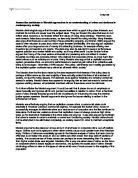Whilst Durkheim, too, categorized types of suicide, he failed to prove that people actually commit suicide for the reasons he gave after not using qualitative data like Jacobs did. Instead, Durkheim relied on coroners’ statistics which are essentially just socially constructed in various ways depending on what the coroner classed as suicide. Interpretive approaches to suicide therefore have the obvious advantage that they do not rely on statistics as a source of evidence which are subject to bias and inaccuracies. This therefore suggests that interpretive methods may be of much more value when studying suicide.
The notion of examining the meanings of actions and behavior in society is a common feature of all interpretive approaches in sociology, and for Douglas’ approach to the study of suicide, it was no different. Douglas (1967) looked at categorizing suicides according to their social meanings because the causes and responses to suicide vary from society to society. He claimed that there are four main types of suicide: “transforming the self”, “transforming oneself for others”, “achieving fellow feeling” and “gaining revenge”. These four different types of suicide therefore prove that the only thing that acts of suicide have in common is death. Douglas’ analysis of suicide therefore shows how interpretive approaches can provide a fresh outlook on an area of sociology which has traditionally been left explained by Durkheim’s theory linked to social integration. Interpretive approaches, therefore, may well be more useful and valid than positivistic approaches when looking at the sociological issue of suicide in society today.
Positivists, however, would argue that certain interpretive approaches lack any usefulness at all in the study of suicide. For example, they would point to the fact that interpretive approaches which use suicide notes, like Jacobs’, involve the sociologist’s own interpretation being used when deciding what drove someone to their suicide. This same argument can be made against interpretive approaches which use qualitative data like diaries and other literary sources when examining suicide.
The fact that interpretive approaches to the study of suicide tend to be of much smaller scale than positivistic ones is another one of their flaws. With Durkheim’s study of suicide, suicide statistics were used from around Europe which subsequently allowed him to establish the causes of suicide in different types of society. Jacobs, on the other hand, carried out a study in just one city (Los Angeles), this meant that the study was only representative of one location.
Whether or not interpretive approaches to the study of suicide can be classified as useful, depends entirely upon whether or not interpretive approaches in sociology are regarded as a suitable way of explaining human behavior in general. In other words, interpretive sociologists would claim that suicide is a highly personal act, and that anyone’s motives for wanting to commit suicide are likely to be very intricate and detailed, and therefore, can only be discovered by examining personal documents like suicide notes. Positivists, however, would claim – just like they do in all areas of sociology – that a scientific approach should be adopted when examining the causes of suicide. Consequently, they would reject interpretive approaches on the grounds of them lacking objectivity and reliability. But the question still remains as to whether or not positivistic approaches are should be used in an area like the study of suicide. Although positivist approaches have much value in other areas of sociology, many claim that for this area in particular interpretive methods should be used.







